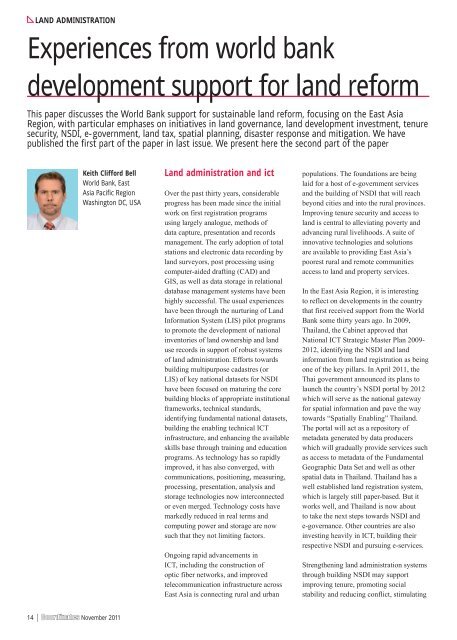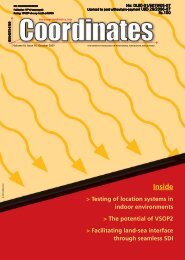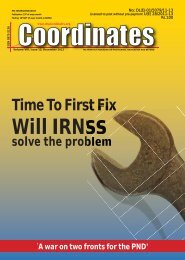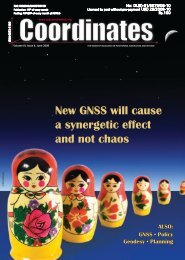Download - Coordinates
Download - Coordinates
Download - Coordinates
You also want an ePaper? Increase the reach of your titles
YUMPU automatically turns print PDFs into web optimized ePapers that Google loves.
LAND ADMINISTRATION<br />
Experiences from world bank<br />
development support for land reform<br />
This paper discusses the World Bank support for sustainable land reform, focusing on the East Asia<br />
Region, with particular emphases on initiatives in land governance, land development investment, tenure<br />
security, NSDI, e-government, land tax, spatial planning, disaster response and mitigation. We have<br />
published the fi rst part of the paper in last issue. We present here the second part of the paper<br />
Keith Clifford Bell<br />
World Bank, East<br />
Asia Pacifi c Region<br />
Washington DC, USA<br />
14 | <strong>Coordinates</strong> November 2011<br />
Land administration and ict<br />
Over the past thirty years, considerable<br />
progress has been made since the initial<br />
work on first registration programs<br />
using largely analogue, methods of<br />
data capture, presentation and records<br />
management. The early adoption of total<br />
stations and electronic data recording by<br />
land surveyors, post processing using<br />
computer-aided drafting (CAD) and<br />
GIS, as well as data storage in relational<br />
database management systems have been<br />
highly successful. The usual experiences<br />
have been through the nurturing of Land<br />
Information System (LIS) pilot programs<br />
to promote the development of national<br />
inventories of land ownership and land<br />
use records in support of robust systems<br />
of land administration. Efforts towards<br />
building multipurpose cadastres (or<br />
LIS) of key national datasets for NSDI<br />
have been focused on maturing the core<br />
building blocks of appropriate institutional<br />
frameworks, technical standards,<br />
identifying fundamental national datasets,<br />
building the enabling technical ICT<br />
infrastructure, and enhancing the available<br />
skills base through training and education<br />
programs. As technology has so rapidly<br />
improved, it has also converged, with<br />
communications, positioning, measuring,<br />
processing, presentation, analysis and<br />
storage technologies now interconnected<br />
or even merged. Technology costs have<br />
markedly reduced in real terms and<br />
computing power and storage are now<br />
such that they not limiting factors.<br />
Ongoing rapid advancements in<br />
ICT, including the construction of<br />
optic fiber networks, and improved<br />
telecommunication infrastructure across<br />
East Asia is connecting rural and urban<br />
populations. The foundations are being<br />
laid for a host of e-government services<br />
and the building of NSDI that will reach<br />
beyond cities and into the rural provinces.<br />
Improving tenure security and access to<br />
land is central to alleviating poverty and<br />
advancing rural livelihoods. A suite of<br />
innovative technologies and solutions<br />
are available to providing East Asia’s<br />
poorest rural and remote communities<br />
access to land and property services.<br />
In the East Asia Region, it is interesting<br />
to reflect on developments in the country<br />
that first received support from the World<br />
Bank some thirty years ago. In 2009,<br />
Thailand, the Cabinet approved that<br />
National ICT Strategic Master Plan 2009-<br />
2012, identifying the NSDI and land<br />
information from land registration as being<br />
one of the key pillars. In April 2011, the<br />
Thai government announced its plans to<br />
launch the country’s NSDI portal by 2012<br />
which will serve as the national gateway<br />
for spatial information and pave the way<br />
towards “Spatially Enabling” Thailand.<br />
The portal will act as a repository of<br />
metadata generated by data producers<br />
which will gradually provide services such<br />
as access to metadata of the Fundamental<br />
Geographic Data Set and well as other<br />
spatial data in Thailand. Thailand has a<br />
well established land registration system,<br />
which is largely still paper-based. But it<br />
works well, and Thailand is now about<br />
to take the next steps towards NSDI and<br />
e-governance. Other countries are also<br />
investing heavily in ICT, building their<br />
respective NSDI and pursuing e-services.<br />
Strengthening land administration systems<br />
through building NSDI may support<br />
improving tenure, promoting social<br />
stability and reducing conflict, stimulating

















